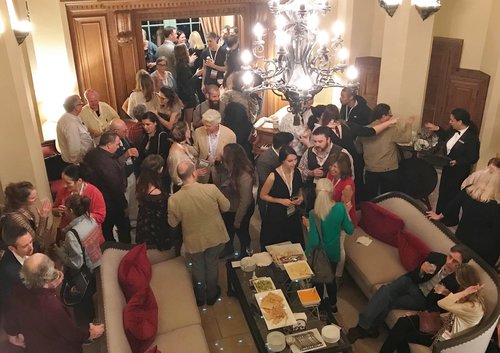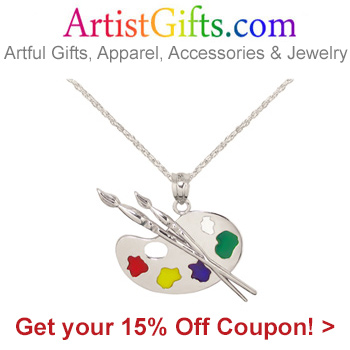by Carolyn Edlund
The network of contacts you develop can have an immense influence on your success as an artist.

Artists need exposure, for their work and for themselves. It’s essential in order to find opportunities, receive invitations to collaborate, and gain representation. If you’re serious about advancing your art career, make it a priority to get out of the studio and meet other people on a regular basis. Developing and growing a strong and diversified network of contacts is a proven component of successful art careers.
You Can’t Go It Alone
Artists who work in isolation tend to fail when compared to artists who have the support of an art community. Get involved by joining professional organizations, and attending salons or meetups. This puts you in touch with others who share your interests and goals. You may find their experience, advice and feedback to be invaluable.
Art communities can offer feedback, critique, resources, opportunities, and moral support. You can find these groups online as well as offline, but there is no substitute for live introductions and in-person meetings. These can be the seed for long-term business relationships that turn into friendships as well.
Your Peers Matter
You may not have the full support of your family members, who buy into the starving artist myth. Friends might wish you well, but not truly believe that artists can earn a good living from their work. Many artists find that their best support system comes from serious artists on the same journey. Rather than viewing other artists as the competition, think of them as allies. They may challenge you to think differently, take risks and go for your big goals.
“It’s easy to get caught up in a particular story of ‘how things are.’ A supportive network can introduce us to useful alternatives to the stories that don’t serve us.” – James Moore
Not only do peer groups provide many of the same benefits as art communities, they also offer collaboration. Peers may act as accountability partners or mentors. They may trade their skills with you and other group members to collectively help everyone thrive. Quite often, artists mention their peer group as a major factor in their success.
Social Interaction is Key to Making Professional Gains
Interested in getting accepted into a gallery? Invest time in building your network. A look at the Top 10 Ways Galleries Find Artists reveals that the best way to gain gallery representation is to be introduced by another artist. Number two is getting a curator recommendation (another reason to socialize.) The list continues with items such as juried shows and open studios. Clearly, events where people meet people and make important connections get results.
Art fairs are on the list too, and according to stARTup Art Fair promoter Ray Beldner, “If the fair is a good one and the producers have done their work properly, you should be able to meet more dealers, curators, art buyers, and art consultants in one weekend than you can do on your own in a year or two.”
Round out your networking activities to meet collectors, press members, art advocates, and industry experts. Any of them may become a useful contact, introducing you to people who can help you grow your business. They may also produce referral sales for you.
“I have benefited greatly from looking beyond the little ‘silo’ I call my studio to gain wider vision and perspectives from people smarter, more experienced, or better connected than myself. On both a professional and informal basis, I have leveraged my ever-expanding network of artists, clients and corporate contacts for introductions, critiques, processes and ideas that I could never have achieved on my own.” – Steven Lester
Successful Artists Know the Value of Their Network
What is the biggest factor in achieving fame as as artist? Believe it or not, it is through developing a large and diverse network of contacts. Talent and creative ability, however, are not significant factors in becoming famous (see this fascinating study published by Columbia Business School.)
It is, to a large extent, who you know and who they know that leads to opportunities and business growth. As you build connections and turn them into strong authentic relationships, you will be known and remembered by a variety of people who can assist you in your career.


By nature, artists tend to shy away from the concept of networking. However, as a creativity coach, I often visual artists in stepping out of their comfort zones to build both the confidence and passion to network and open themselves up to opportunity.
Sometimes it’s helpful to ask artists, “What would be more painful, for you? Never sharing your gift with the world, or working towards sharing your gift with the world”? Few ever say the latter would be more painful. Many artists would rather spend their time “doing” than “dreaming”.
Networking opens us up to not only sales opportunities, but support systems and resources that we can rely on over time to help build our business. Also, it’s reassuring to know that there are people out there on similar journeys and those who have travelled the road before us who are willing to share. So there’s really no need to feel so alone.
It’s not an easy thing to do, and even as an artist myself I am often hesitant, but indeed as you’ve mentioned, networking is key to success.
Great insights, Vanessa. It can be a bit intimidating for some artists to get out and interact socially, but over time gets much easier. Considering how very important it is to an art career to make those connections, I highly suggest that all artists make the effort.
Likewise, sales can be an intimidating process, but if you want to sell your art, you are a salesperson. This is something that every serious entrepreneur must come to terms with.